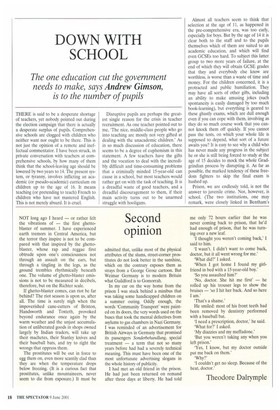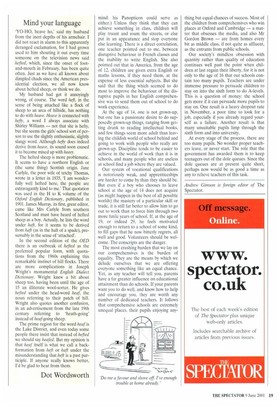DOWN WITH SCHOOL
The one education cut the government
needs to make, says Andrew Gimson,
is to the number of pupils
THERE is said to be a desperate shortage of teachers, yet nobody pointed out during the election campaign that there is actually a desperate surplus of pupils. Comprehensive schools are clogged with children who neither want nor ought to be there. This is not just the opinion of a remote and ineffectual commentator. I have been struck, in private conversation with teachers at comprehensive schools, by how many of them think that the school-leaving age should be lowered by two years to 14. The present system, or tyranny, involves inflicting an academic (or pseudo-academic) curriculum on children up to the age of 16. It means teaching (or pretending to teach) French to children who have not mastered English. This is not merely absurd. It is cruel. Disruptive pupils are perhaps the greatest single reason for the crisis in teacher recruitment. As one teacher pointed out to me, 'The nice, middle-class people who go into teaching are mostly not very gifted at dealing with the unacademic children.' As in so much discussion of education, there seems to be a degree of euphemism in this statement. A few teachers have the gifts and the vocation to deal with the incredibly difficult and time-consuming problems that a criminally minded 15-year-old can cause in a school, but most teachers would rather get on with the task of teaching. It is a dreadful waste of good teachers, and a dreadful discouragement to them, if their main activity turns out to be unarmed struggle with hooligans. Almost all teachers seem to think that selection at the age of 11, as happened in the pre-comprehensive era, was too early, especially for boys. But by the age of 14 it is clear both to the staff and to the pupils themselves which of them are suited to an academic education, and which will find even GCSEs too hard. To subject this latter group to two more years of failure, at the end of which they will obtain GCSE grades that they and everybody else know are worthless, is worse than a waste of time and money. For the children concerned, it is a protracted and public humiliation. They may have all sorts of other gifts, including an ability to make amusing jokes (such spontaneity is easily damaged by too much book-learning), but everything is geared to these ghastly exams, which are dull enough even if you can cope with them, involving as they do so much course work that you cannot knock them off quickly. If you cannot pass the tests, on which your whole life is supposed to depend, what sort of a future awaits you? It is easy to see why a child who has never made any progress in the subject he or she is still being forced to study at the age of 15 decides to mock the whole GradgrMdian process by disrupting it. As far as possible, the marked tendency of these freedom fighters to skip the final exam is hushed up.
Prison, we are endlessly told, is not the answer to juvenile crime. Nor, however, is school. (The two institutions, one may remark, were closely linked in Bentham's mind: his Panopticon could serve as either.) Unless they think that they can achieve something in class, children will play truant and roam the streets, or else put in an appearance and stop everyone else learning. There is a direct correlation, one teacher pointed out to me, between disruptive behaviour in French classes and the inability to write English. She also pointed out that in America, from the age of 12, children are given extra English or maths lessons, if they need them, at the expense of less essential subjects. But she said that the thing which seemed to do most to improve the behaviour of the disruptive pupils in her English comprehensive was to send them out of school to do work experience.
At the age of 14, one is not grown-up, but one has a passionate desire to do supposedly grown-up things, ranging from getting drunk to reading intellectual books, and few things seem more adult than leaving the childish world of school behind and going to work with people who really are grown-up. Discipline tends to be easier to achieve in the world of work than it is in schools, and many people who are useless at school find a job where they are valued.
Our system of vocational qualifications is notoriously weak, and apprenticeships are harder to come by than they should be. But even if a boy who chooses to leave school at the age of 14 does not acquire (as might happen in the best of all possible worlds) the mastery of a particular skill or trade, it is still far better to allow him to go out to work than to force him through two more futile years of school. If, at the age of 19, or indeed 29, he feels motivated enough to return to a school of some kind, to fill gaps that he now bitterly regrets, all well and good. Volunteers should be welcome. The conscripts are the danger.
The most crushing burden that we lay on our comprehensives is the burden of equality. They are the means by which we delude ourselves that we are offering everyone something like an equal chance. Yet, as any teacher will tell you, parents have a far greater influence on educational attainment than do schools. If your parents want you to do well, and know how to help and encourage you, they are worth any number of dedicated teachers. It follows that comprehensive schools are extremely unequal places, their pupils enjoying any thing but equal chances of success. Most of the children from comprehensives who win places at Oxford and Cambridge — a matter that obsesses the media, and also Mr Gordon Brown — are from homes every bit as middle class, if not quite as affluent, as the entrants from public schools.
Our society's mindless obsession with quantity rather than quality of education continues well past the point when children at last regain their liberty, for it is not only to the age of 16 that our schools contain too many pupils. Teachers are under immense pressure to persuade children to stay on into the sixth form to do A-levels. This is a question of money: the school gets more if it can persuade more pupils to stay on. One result is a heavy dropout rate in November, a poor time to look for a job, especially if you already regard yourself as a failure. Another result is that many unsuitable pupils limp through the sixth form and into university.
At every stage of the process, there are too many pupils. No wonder proper teachers leave, or never start. The role that the government has awarded them is to keep teenagers out of the dole queues. Since the dole queues are at present quite short, perhaps now would be as good a time as any to relieve teachers of this task.
Andrew Gimson is foreign editor of The Spectator.



































































 Previous page
Previous page